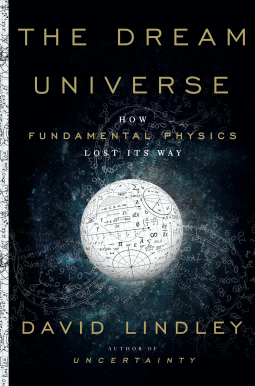
The Dream Universe
How Fundamental Physics Lost Its Way
by David Lindley
This title was previously available on NetGalley and is now archived.
Buy on Amazon
Buy on BN.com
Buy on Bookshop.org
*This page contains affiliate links, so we may earn a small commission when you make a purchase through links on our site at no additional cost to you.
Send NetGalley books directly to your Kindle or Kindle app
1
To read on a Kindle or Kindle app, please add kindle@netgalley.com as an approved email address to receive files in your Amazon account. Click here for step-by-step instructions.
2
Also find your Kindle email address within your Amazon account, and enter it here.
Pub Date Mar 17 2020 | Archive Date Mar 31 2020
Doubleday Books | Doubleday
Talking about this book? Use #TheDreamUniverse #NetGalley. More hashtag tips!
Description
A vivid and captivating narrative about how modern science broke free of ancient philosophy, and how theoretical physics is returning to its unscientific roots
In the early seventeenth century Galileo broke free from the hold of ancient Platonic and Aristotelian philosophy. He drastically changed the framework through which we view the natural world when he asserted that we should base our theory of reality on what we can observe rather than pure thought. In the process, he invented what we would come to call science. This set the stage for all the breakthroughs that followed--from Kepler to Newton to Einstein. But in the early twentieth century when quantum physics, with its deeply complex mathematics, entered into the picture, something began to change. Many physicists began looking to the equations first and physical reality second. As we investigate realms further and further from what we can see and what we can test, we must look to elegant, aesthetically pleasing equations to develop our conception of what reality is. As a result, much of theoretical physics today is something more akin to the philosophy of Plato than the science to which the physicists are heirs. In The Dream Universe, Lindley asks what is science when it becomes completely untethered from measurable phenomena?
In the early seventeenth century Galileo broke free from the hold of ancient Platonic and Aristotelian philosophy. He drastically changed the framework through which we view the natural world when he asserted that we should base our theory of reality on what we can observe rather than pure thought. In the process, he invented what we would come to call science. This set the stage for all the breakthroughs that followed--from Kepler to Newton to Einstein. But in the early twentieth century when quantum physics, with its deeply complex mathematics, entered into the picture, something began to change. Many physicists began looking to the equations first and physical reality second. As we investigate realms further and further from what we can see and what we can test, we must look to elegant, aesthetically pleasing equations to develop our conception of what reality is. As a result, much of theoretical physics today is something more akin to the philosophy of Plato than the science to which the physicists are heirs. In The Dream Universe, Lindley asks what is science when it becomes completely untethered from measurable phenomena?
Available Editions
| EDITION | Other Format |
| ISBN | 9780385543859 |
| PRICE | $26.95 (USD) |
| PAGES | 240 |



